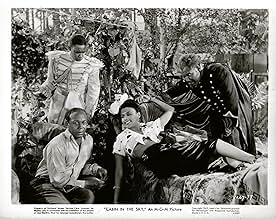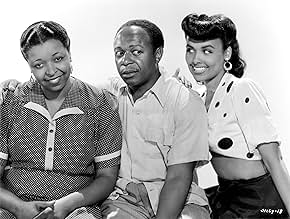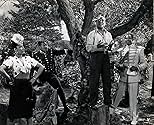CALIFICACIÓN DE IMDb
7.1/10
3.5 k
TU CALIFICACIÓN
Agrega una trama en tu idiomaA compulsive gambler dies during a shooting, but he'll receive a second chance to reform himself and to make up with his worried wife.A compulsive gambler dies during a shooting, but he'll receive a second chance to reform himself and to make up with his worried wife.A compulsive gambler dies during a shooting, but he'll receive a second chance to reform himself and to make up with his worried wife.
- Nominado a 1 premio Óscar
- 1 premio ganado y 3 nominaciones en total
John W. Bubbles
- Domino Johnson
- (as 'Bubbles' [John W. Sublett])
Fletcher Rivers
- Third Idea Man
- (as Moke [Fletcher Rivers])
Leon James
- Fourth Idea Man
- (as Poke [Leon James])
Bill Bailey
- Bill
- (as dancer Taking A Chance On Love)
Ford Washington Lee
- Messenger Boy
- (as 'Buck' [Ford L. Washington])
Nick Stewart
- Dude
- (as Nicodemus)
- Dirección
- Guionistas
- Todo el elenco y el equipo
- Producción, taquilla y más en IMDbPro
Argumento
¿Sabías que…?
- TriviaThis film is generally credited with the first appearance of the "moon walk" dance step. It is performed by Bill Bailey, brother of Pearl Bailey.
- ErroresDuring the nightclub fight between Domino Johnson and Little Joe, the gunshot he fires accidentally hits Petunia. She falls down on the steps of the staircase, where she drapes her right arm twice over the side.
- Citas
Petunia Jackson: [after she runs Jim Henry and his crony off] Oh, Lord! Please forgive me for backsliding, but sometimes when you fight the Devil you've got to jab him with his own pitchfork!
- ConexionesFeatured in The Men Who Made the Movies: Vincente Minnelli (1973)
- Bandas sonorasLi'l Black Sheep
(1943)
Music by Harold Arlen
Lyrics by E.Y. Harburg
Performed by Ethel Waters (uncredited) and chorus
Opinión destacada
Cabin in the Sky marks the debut of director Vincente Minnelli, one of cinema's greatest and most prolific directors of musicals. Already an experienced stage director, pianist and perhaps most importantly of all a painter, Minnelli came to Hollywood as the protégé of lyricist-turned producer Arthur Freed one of the most significant names in the development of the screen musical.
Although this is one of his cheaper productions (as evidenced by the simplicity of the sets and the use of borrowed footage) Cabin in the Sky is no exception to the typical Freed pattern of assembling a wide variety of musical talent. Here we get to enjoy virtually all the biggest names in black entertainment of the day the gorgeous singing voice of Ethel Waters, the musicianship of Duke Ellington and Louis Armstrong, the dancing of Bill Bailey and John William Sublett, to name just a few. With this line-up, Cabin in the Sky was bound to be a great show, but it was also likely to fall into the same trap as many of the Freed musicals that you might have a great variety show, but not a unified, coherent musical.
This is somewhat the case here, especially as the story is rather flimsy and clichéd. What saves it is Freed's firm belief in the integrated musical (every song woven into the plot) and Minnelli's inventive direction. Freed more or less gave Minnelli free rein over the staging of the musical numbers. Whereas in many of the earlier musicals there is a very conscious break in style whenever a song begins, in Cabin in the Sky each number flows seamlessly into the action. For example, in "Happiness Is a Thing Called Joe", Ethel Waters' singing begins with no prior cues to the audience that a song is about to start. The narrative then leaps ahead to her hanging out the washing while the song continues. The number finishes with Rex Ingram and his Buddy appearing from behind a sheet, leading us into the next scene. The narrative has not taken a break for the song it has continued alongside it.
Also in evidence is Minnelli's graceful visual style. Minnelli, with his painter's eye, delicately frames his subjects with doorways and overhanging branches. You can also see his developing talent for movement flowing in and out of the frame, particularly in the "Li'l Black Sheep" number in the church. Perhaps the most typical "Minnelli" moment is in the large group shot that he puts together for the title song, the camera pulling out to reveal the whole crowd as the singing reaches a crescendo. For all its beauty though, it does seem to be a rather strained effort, and in his later pictures he would stage sequences that were far more complex and yet looked far more effortless.
A quick word about the actors. While most of the cast were hired more for their ability to sing or dance than anything else, those of them taken on purely as actors are nevertheless a joy to watch. Rex Ingram gets to do what he does best in an extravagant performance as "Lucifer Jr.", and is almost as scene-stealing as he was as the genie in Thief of Bagdad. And Butterfly McQueen's role may be small, but at least she really gets to act here, rather than appearing as a comic relief funny voice.
The songs too are wonderful. The Arlen/Harburg numbers which were written especially for the film version are not as good as anything they did for Wizard of Oz, but then what is? The real highlights though are the original Vernon Duke/John La Touche songs, especially the sublime "Taking a Chance on Love", and it's a shame these two barely made a splash in musicals.
In spite of all this, Cabin in the Sky is still best enjoyed as a series of performances. It is wonderful to watch, not least because it is a showcase for the talents of a whole group of entertainers who made far too few screen appearances, but it doesn't stand up as a musical in its own right.
Although this is one of his cheaper productions (as evidenced by the simplicity of the sets and the use of borrowed footage) Cabin in the Sky is no exception to the typical Freed pattern of assembling a wide variety of musical talent. Here we get to enjoy virtually all the biggest names in black entertainment of the day the gorgeous singing voice of Ethel Waters, the musicianship of Duke Ellington and Louis Armstrong, the dancing of Bill Bailey and John William Sublett, to name just a few. With this line-up, Cabin in the Sky was bound to be a great show, but it was also likely to fall into the same trap as many of the Freed musicals that you might have a great variety show, but not a unified, coherent musical.
This is somewhat the case here, especially as the story is rather flimsy and clichéd. What saves it is Freed's firm belief in the integrated musical (every song woven into the plot) and Minnelli's inventive direction. Freed more or less gave Minnelli free rein over the staging of the musical numbers. Whereas in many of the earlier musicals there is a very conscious break in style whenever a song begins, in Cabin in the Sky each number flows seamlessly into the action. For example, in "Happiness Is a Thing Called Joe", Ethel Waters' singing begins with no prior cues to the audience that a song is about to start. The narrative then leaps ahead to her hanging out the washing while the song continues. The number finishes with Rex Ingram and his Buddy appearing from behind a sheet, leading us into the next scene. The narrative has not taken a break for the song it has continued alongside it.
Also in evidence is Minnelli's graceful visual style. Minnelli, with his painter's eye, delicately frames his subjects with doorways and overhanging branches. You can also see his developing talent for movement flowing in and out of the frame, particularly in the "Li'l Black Sheep" number in the church. Perhaps the most typical "Minnelli" moment is in the large group shot that he puts together for the title song, the camera pulling out to reveal the whole crowd as the singing reaches a crescendo. For all its beauty though, it does seem to be a rather strained effort, and in his later pictures he would stage sequences that were far more complex and yet looked far more effortless.
A quick word about the actors. While most of the cast were hired more for their ability to sing or dance than anything else, those of them taken on purely as actors are nevertheless a joy to watch. Rex Ingram gets to do what he does best in an extravagant performance as "Lucifer Jr.", and is almost as scene-stealing as he was as the genie in Thief of Bagdad. And Butterfly McQueen's role may be small, but at least she really gets to act here, rather than appearing as a comic relief funny voice.
The songs too are wonderful. The Arlen/Harburg numbers which were written especially for the film version are not as good as anything they did for Wizard of Oz, but then what is? The real highlights though are the original Vernon Duke/John La Touche songs, especially the sublime "Taking a Chance on Love", and it's a shame these two barely made a splash in musicals.
In spite of all this, Cabin in the Sky is still best enjoyed as a series of performances. It is wonderful to watch, not least because it is a showcase for the talents of a whole group of entertainers who made far too few screen appearances, but it doesn't stand up as a musical in its own right.
- Steffi_P
- 17 sep 2008
- Enlace permanente
Selecciones populares
Inicia sesión para calificar y agrega a la lista de videos para obtener recomendaciones personalizadas
- How long is Cabin in the Sky?Con tecnología de Alexa
Detalles
Taquilla
- Presupuesto
- USD 662,141 (estimado)
- Tiempo de ejecución1 hora 38 minutos
- Relación de aspecto
- 1.37 : 1
Contribuir a esta página
Sugiere una edición o agrega el contenido que falta

Principales brechas de datos
By what name was Una cabaña en las nubes (1943) officially released in India in English?
Responda
































